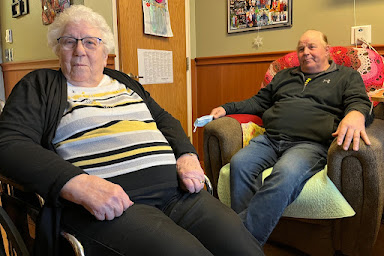 |
| Marjorie Kruger and son Dan White at the Evangelical Lutheran Good Samaritan Society nursing home in Waukon, Iowa. (Photo by Tony Leys, Kaiser Health News) |
"Many care centers that have managed to remain open are keeping some beds vacant because they don’t have enough workers to responsibly care for more residents," Leys reports, noting shortages of "nurses, nursing assistants, and kitchen employees."
Last year, 13 of the 15 Iowa nursing homes that closed "were in rural areas, according to the Iowa Health Care Association," Leys reports. Brent Willett, the association’s president, told Leys, “In more sparsely populated areas, it’s harder and harder to staff those facilities,” partly because many rural areas have fewer working-age adults.
The closure of a nursing home or assisted-living facility can have traumatic effects on residents and their families. "The lack of open nursing home beds is marooning some patients in hospitals for weeks while social workers seek placements," Leys reports. "More people are winding up in care facilities far from their hometowns, especially if they have dementia, obesity, or other conditions that require extra attention."
Leys starts his story with Marjorie Kruger, 98, who "was stunned to learn last fall that she would have to leave the nursing home where she’d lived comfortably for six years" in Postville. She told him, “The rug was taken out from under me. I thought I was going to stay there the rest of my life.” Her son found her another home, "but she misses her friends and longtime staffers from the old one," Leys writes. "The Postville facility’s former residents are scattered across northeastern Iowa. Some were forced to move twice, after the first nursing home they transferred to also went out of business."
No comments:
Post a Comment